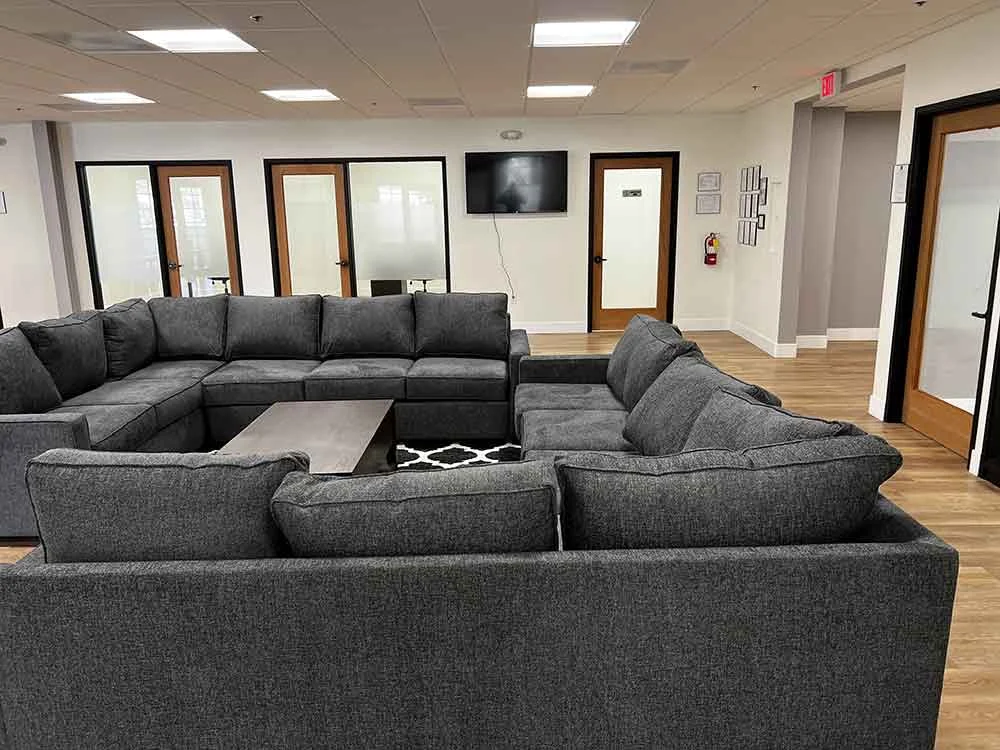In the United States, substance abuse among men is a significant public health concern, with men more likely to use almost all types of illicit drugs. Statistics show that men are twice as likely as women to develop substance use disorders. According to the National Institute on Drug Abuse (NIDA), approximately 12.8% of males aged 12 or older have a substance use disorder, compared to 7.7% of females. These figures underscore the disparity between genders and the higher vulnerability of men to substance abuse.
Additionally, alcohol abuse is more prevalent among men, who are more likely to binge drink and develop alcohol dependence. This pattern of higher consumption and addiction rates highlights the urgent need for targeted addiction treatment programs for men.
Santa Barbara Recovery is a premier addiction and mental health rehab for men and is dedicated to addressing the unique needs of men struggling with substance abuse. Our comprehensive treatment programs provide individualized care, combining evidence-based therapies with holistic approaches to promote long-term recovery.
By focusing on the specific challenges men face in overcoming substance abuse, we aim to develop more effective intervention and support strategies, helping our clients achieve sustainable recovery and improved mental health.

Spotting the Signs of Addiction in Men
Recognizing addiction in men can be challenging, especially because many men tend to hide their substance use issues due to stigma or fear of judgment. Common signs of addiction in men include:
1. Increased tolerance to the substance.
2. Withdrawal symptoms when not using the substance.
3. Neglecting responsibilities at work, school, or home.
4. Changes in behavior, such as becoming secretive or isolating themselves.
5. Money troubles from spending on substances.
6. Legal issues related to substance use.
Rehab for men can provide the specialized care and support needed to overcome addiction, addressing both the physical and psychological aspects of recovery.
Spotting the Signs of Mental Health Issues in Men
Mental health issues in men often go unnoticed because men are less likely to seek help or discuss their feelings. Some signs that may indicate a man is struggling with mental health include:
1. Persistent sadness or irritability.
2. Loss of interest in activities once enjoyed.
3. Changes in appetite or sleep patterns.
4. Difficulty concentrating or making decisions.
5. Increased use of alcohol or drugs to cope with emotions.
6. Suicidal thoughts or behaviors.
Recognizing these symptoms and encouraging open conversations about mental health can make a significant difference in a man’s life.

How Does Substance Abuse Affect Men Differently?
Substance abuse affects men differently than women due to various biological, psychological, and social factors.
- Biological Factors: Substance abuse affects men differently due to various biological factors. Men are more likely to experience severe withdrawal symptoms and physical health issues related to substance use. Some of these issues include liver disease and heart problems, which are more prevalent among men who abuse substances.
- Psychological Factors: Psychologically, men may turn to substances as a way to cope with stress, trauma, or mental health issues. This can lead to a cycle of dependency, where substance use exacerbates the very issues it is intended to mitigate, creating a harmful feedback loop.
- Social Factors: Social factors also play a significant role in how substance abuse affects men. Men often face societal pressure to conform to traditional masculine norms, which can discourage them from seeking help or expressing vulnerability. This social stigma can prevent men from accessing the support and treatment they need.
What Types of Drug & Alcohol Treatment Programs Are Available for Men?
There are various drug and alcohol treatment programs specifically designed for men, each offering unique approaches to address their specific needs. These programs include:
1. Inpatient Rehabilitation: Provides a structured environment with 24/7 support, ideal for those with severe addictions.
2. Outpatient Programs: Allow men to receive treatment while maintaining their daily responsibilities.
3. Detoxification (Detox): Helps men safely withdraw from substances under medical supervision.
4. Therapeutic Communities: Offer long-term residential treatment focusing on community and peer support.
5. Behavioral Therapies: Cognitive Behavioral Therapy (CBT) and Motivational Interviewing (MI) help men change harmful behaviors and develop coping strategies.
Each of these programs can be tailored to address the unique challenges men face in their recovery journey.
What Types of Mental Health Treatment Programs Are Available for Men?
Men can benefit from a range of mental health treatment programs designed to address their specific needs, including:
1. Individual Therapy: Provides a confidential space for men to explore their thoughts and feelings.
2. Group Therapy: Offers peer support and reduces feelings of isolation.
3. Medication Management: Assists in managing symptoms of mental health conditions such as depression or anxiety.
4. Family Therapy: Engages family members in the treatment process to strengthen communication and support.
5. Holistic Therapies: Such as mindfulness, yoga, and art therapy, which promote overall well-being.
These programs can help men develop healthy coping mechanisms and improve their mental health.
What are the Benefits of a Gender-Specific Rehab?
Gender-specific rehab programs offer numerous benefits, including:
- Personalized Treatment Approaches: Gender-specific rehab programs offer treatments tailored to the unique biological and psychological needs of men and women, enhancing the effectiveness of therapy and medical care.
- Focused Group Therapy: In gender-specific rehab, individuals share experiences and challenges unique to their gender, fostering understanding and camaraderie in a safe and comfortable environment.
- Addressing Gender-Specific Issues: These programs address gender-specific issues like trauma and societal pressures, providing targeted support and addressing factors that significantly impact addiction and recovery.
- Reduction of Distractions: A single-gender environment reduces romantic or sexual distractions, allowing participants to focus more on their recovery while feeling less judged and more supported.
- Role Modeling and Mentoring: Gender-specific rehabs provide positive role models and foster mentorship opportunities, inspiring and motivating participants through shared experiences and guidance.
- Tailored Educational Programs: These programs offer life skills training and health education tailored to the specific needs of men and women, ensuring comprehensive and relevant care.
- Building a Support Network: Participants often form strong bonds with peers, creating a solid support network during and after treatment. These programs also connect individuals with gender-specific community resources.
- Improved Treatment Outcomes: Gender-specific rehabs enhance engagement and understanding, leading to better participation and long-term recovery outcomes while reducing the likelihood of relapse.

Men's Mental Health Stigma: How to Break It
Traditional gender roles and societal expectations often portray men as strong, stoic, and self-reliant, which discourages them from expressing vulnerability or seeking help. Around 40% of men won’t talk about their mental health due to fear of judgment, a lack of emotional literacy, and cultural influences. They worry about being perceived as weak or unmanly and may believe they should handle their problems alone, viewing admitting to mental health struggles as a personal failure. Breaking the stigma surrounding men’s mental health requires concerted efforts at various levels:
- Education: Education raises awareness about mental health and challenges harmful stereotypes that discourage men from seeking help. It informs the public about mental health struggles and societal expectations affecting men, dispels myths, and fosters a supportive environment for recovery.
- Encouragement: Encouragement promotes open conversations about mental health, normalizing discussions about emotions and well-being. It creates a culture where seeking help is seen as a strength, empowering men to address their issues without fear of judgment.
- Supportive Environments: Supportive environments create safe spaces for men to discuss their feelings and seek help. These environments foster trust and acceptance, providing tailored treatment plans and peer support networks that enhance recovery. Santa Barbara Recovery’s Men’s Rehab in California plays a crucial role in breaking the stigma by providing comprehensive treatment and support tailored to men’s needs.
Dual Diagnosis Treatment for Men
Dual diagnosis treatment addresses both substance use disorders and co-occurring mental health conditions. This integrated approach is essential for men who struggle with both addiction and mental health issues, as it provides comprehensive care that addresses all aspects of their health. Dual diagnosis treatment at Santa Barbara Recovery includes:
1. Comprehensive assessments are conducted to identify co-occurring disorders, ensuring that any underlying mental health issues are addressed alongside addiction treatment.
2. Integrated treatment plans are then developed, combining addiction treatment and mental health care to provide a holistic approach to recovery. These plans ensure that both aspects of a person’s well-being are treated concurrently, leading to more effective outcomes.
3. Specialized therapies, such as trauma-informed care and behavioral therapies, are also offered to address specific needs. Trauma-informed care helps individuals process and heal from past traumas, while behavioral therapies focus on changing harmful patterns of thinking and behavior, equipping individuals with healthier coping mechanisms.
This approach ensures that men receive the holistic care they need for lasting recovery.
Helping Men Break the Stigma at Santa Barbara Recovery
Santa Barbara Recovery’s rehab for men in California is dedicated to helping men break the stigma surrounding mental health and addiction by offering personalized treatment plans tailored to each individual’s needs, comprehensive care addressing both addiction and mental health issues, and a supportive community fostering a sense of belonging and mutual support. Through education and advocacy, we raise awareness about men’s mental health and promote positive change, empowering men to overcome their challenges and achieve lasting recovery in a safe and supportive environment. Contact us today to learn more about our programs!
References
https://nida.nih.gov/research-topics/sex-gender-and-drug-use













